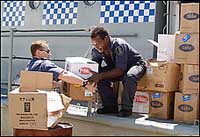Vaccination drive launched as aid efforts pick up pace in post-tsunami Solomons
Health workers added measles vaccinations to emergency aid being given to thousands of tsunami survivors in squalid camps in the Solomon Islands, as a lawmaker expressed concern about an active volcano in the disaster zone.

After a slow start, the international relief effort has picked up pace a week after the huge 8.1-magnitude offshore quake sent walls of water slamming over dozens of villages in the Pacific Island nation's far west. Up to 39 people were killed and 7,000 left homeless.
Shops opened Monday in the hard-hit town of Gizo for the first time since the quake, and fishermen returned to the open-air market, selling their daily catch. Tourists also were returning to the island - a world-renowned diving location.
"I think that's a really healing thing for the people here, because it's the first sign of life getting back to normal again," Red Cross spokeswoman Susie Chippendale said.
Aid groups continued handing out tarps, tents and food packages to thousands of Gizo residents, who have been huddled in their hilltop camps for days, too afraid to come down.
Medical clinics have been built and pit toilets dug to try to control the threat of diseases such as malaria and dysentery in the makeshift camps that have sprung up.
The U.N. children's fund planned to conduct a measles vaccination program for children aged between 6 months and 4 years as part of the effort, U.N. official Peter Muller said.
"When you have people living really close together in camps, children are really vulnerable," Muller said.
Other elements of the relief operation were hitting stride.
Red Cross boats braved stormy seas to deliver food, water and medical assistance to outlying islands that have received little or no aid so far. A helicopter shuttled between Gizo and other far-flung islands.
On the rugged, isolated island of Ranongga, villagers rowed dugout canoes to a Red Cross relief boat and loaded up with rice, water and clothing. Huge patches of coral lay exposed and dying around Ranongga after last week's quake, making boat landings more difficult than usual.
Two barges joined several police boats that are being used around the clock to deliver or load supplies, said U.N. disaster coordinator Antoni Massella.
Axes, machetes and other tools that would help people rebuild their food gardens were due to arrive soon.
Radio broadcasts were also being considered to reassure people there was no further danger - a task made more difficult by regular aftershocks that have rattled the region since the disaster.
Francis Billy Hilly, a legislator from the area, said about 3,000 people on hard-hit Simbo island had asked to be permanently resettled because they fear the earthquake has stirred up a nearby active volcano.
"After the tsunami the whole island smelled of sulfur. They want to be considered to be resettled. They are really scared," said Billy Hilly, a former prime minister.
Scientists have not reported any significant change in activity in the volcano since the tsunami.
Official counts of the dead, missing and injured still vary. Muller said 33 bodies have been recovered and two people remain missing. The aid group World Vision set the count at 39.
All agree the number is unlikely to jump significantly. But some villagers have been burying the dead as they find them, and the true number of deaths may never be known.
Subscribe to Pravda.Ru Telegram channel, Facebook, RSS!


